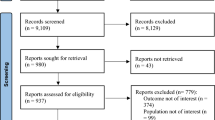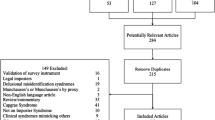Abstract
Objective
Little research has occurred in physicians on the prevalence of adverse childhood experiences (ACEs) and their potential correlation with burnout. The authors hypothesized that there would be a relationship between burnout levels and ACE scores, with physicians reporting more burnout being likely to have higher ACE scores.
Methods
Three hundred physicians completed the ten-question ACE scale and two burnout scales, the Mini-Z, and two items from the Maslach Burnout Inventory.
Results
One hundred and thirty eight (46%) of the physicians were positive on one or the other of the two burnout measures, and 49% of the respondents were positive for at least one ACE, while 9% were positive for four or more ACEs. The most common ACEs reported by the group were having a family member being depressed, being mentally ill, or attempting suicide (22%). The burnout measures correlated strongly with each other (r = 0.68, p < .001), and separate logistic regression models revealed that the physicians with an ACE score of 4 or more had more than two and half times the risk of burnout on either burnout scale measured.
Conclusions
In this group of physicians, almost half reported experiencing ACEs, and half reported symptoms of burnout. The research hypothesis, which physicians reporting more burnout would be more likely to have higher ACE scores, was supported. It is possible that ACEs are a vulnerability factor in physicians for the development of burnout. This possibility and potential protective factors should be further studied.
Similar content being viewed by others
References
Shanafelt TD, Dyrbye LN, West CP. Addressing physician burnout: the way forward. Jama. 2017;317(9):901–2.
Slavin SJ. Medical student mental health: culture, environment, and the need for change. Jama. 2016;316(21):2195–6.
Scheepers RA, Boerebach BC, Arah OA, Heineman MJ, Lombarts KM. A systematic review of the impact of physicians’ occupational well-being on the quality of patient care. Int J Behav Med. 2015;22(6):683–98.
Berg S. How much physician burnout is costing your organization. 2018. www.ama-assn.org. Accessed Nov 2nd 2020.
Shanafelt TD, Mungo M, Schmitgen J, Storz KA, Reeves D, Hayes SN, et al. Longitudinal study evaluating the association between physician burnout and changes in professional work effort. Mayo Clinic Proceedings. 2016;91(4):422–31. https://doi.org/10.1016/j.mayocp.2016.02.001.
Han S, Shanafelt TD, Sinsky CA, Awad KM, Dyrbye LN, Fiscus LC, et al. Estimating the attributable cost of physician burnout in the United States. Annals of internal medicine. 2019;170(11):784–90.
Yellowlees P. Physician suicide: cases and commentaries. Washington DC: American Psychiatric Publishing Incorporated; 2018.
Bohman B, Dyrbye L, Sinsky CA, et al. Physician well-being: the reciprocity of practice efficiency, culture of wellness, and personal resilience. NEJM Catalyst. 2017;3(4). https://catalyst.nejm.org/doi/full/10.1056/CAT.17.0429 Accessed Nov 2nd 2020
Shanafelt TD, Noseworthy JH. Executive leadership and physician well-being: nine organizational strategies to promote engagement and reduce burnout. Mayo Clin Proc. 2017;92(1):129–46. https://doi.org/10.1016/j.mayocp.2016.10.004www.mayoclinicproceedings.org.
Brazeau CM, Shanafelt T, Durning SJ, et al. Distress among matriculating medical students relative to the general population. Acad Med. 2014;89(11):1520–5.
Puthran R, Zhang MW, Tam WW, Ho RC. Prevalence of depression amongst medical students: a meta-analysis. Med Educ. 2016;50(4):456–68.
MacDonald K, Sciolla AF, Folsom D, Bazzo D, Searles C, Moutier C, et al. Individual risk factors for physician boundary violations: the role of attachment style, childhood trauma and maladaptive beliefs. Gen Hosp Psychiatry. 2015;37(1):81–8.
Candib LM, Savageau JA, Weinreb LF, Reed GW. Inquiring into our past: when the doctor is a survivor of abuse. Fam Med. 2012;44(6):416–24.
Sciolla AF, Wilkes MS, Griffin EJ. Adverse childhood experiences in medical students: implications for wellness. Acad Psychiatry. 2019;43(4):369–74.
Strand EB, Brandt J, Rogers K, Fonken L, Chun R, Conlon P, et al. Adverse childhood experiences among veterinary medical students: a multi-site study. J Vet Med Educ. 2017;44(2):260–7.
Felitti VJ, Anda RF, Nordenberg D, et al. Relationship of childhood abuse and household dysfunction to many of the leading causes of death in adults: The Adverse Childhood Experiences (ACE) Study. Am J Prev Med. 1998;14(4):245–58.
Centers for Disease Control and Prevention. Violence Prevention. Adverse Childhoood Experiences. https://www.cdc.gov/violenceprevention/childabuseandneglect/acestudy/index.html?CDC_AA_refVal=https%3A%2F%2Fwww.cdc.gov%2Fviolenceprevention%2Facestudy%2Findex.html. Accessed 30 July 2019.
Aces Too High. http://www.acestoohigh.com. Accessed 2 Nov 2020.
Joy of Medicine: Assessing Physician Well-Being in the Sacramento Region. https://drive.google.com/file/d/1idbdldud-f4VOYpDhrTIRdrVY4DUBhsy/view. Accessed 2 Nov 2020.
National Academy of Medicine. Valid and reliable survey instruments to measure burnout, well-being, and other work-related dimensions. https://nam.edu/valid-reliable-survey-instruments-measure-burnout-well-work-related-dimensions/. Accessed 31 July 2019.
Rohland BM, Kruse GR, Rohrer JE. Validation of a single-item measure of burnout against the Maslach Burnout Inventory among physicians. Stress Health: J Int Soc Investig Stress. 2004;20(2):75–9.
Aguayo R, Vargas C, Emilia I, Lozano LM. A meta-analytic reliability generalization study of the Maslach Burnout Inventory. Int J Clin Health Psychol. 2011;11(2):343–61.
National Academy of Medicine Collaborative on clinician well-being and resilience https://nam.edu/initiatives/clinician-resilience-and-well-being/?gclid=CjwKCAiA-f78BRBbEiwATKRRBKW-SIk-ZlSjOkp4KRTomyhu4f46mskb4wISFHJIXQwyGlloOsmlpxoCTNkQAvD_BwE. Accessed 2 Nov 2020
Acknowledgments
We wish to thank all members of the Sierra Sacramento Valley Medical Society Advisory Committee for the Joy of Medicine Program for their input and support.
Funding
This publication was made possible by a grant from The Physicians Foundation and by funding from the Department of Psychiatry, University of California Davis.
Author information
Authors and Affiliations
Corresponding author
Ethics declarations
Reviewed retrospectively by University of California Davis IRB and deemed “exempt.”
Disclosures
On behalf of all authors, the corresponding author states that there is no conflict of interest.
Additional information
Publisher’s Note
Springer Nature remains neutral with regard to jurisdictional claims in published maps and institutional affiliations.
Rights and permissions
About this article
Cite this article
Yellowlees, P., Coate, L., Misquitta, R. et al. The Association Between Adverse Childhood Experiences and Burnout in a Regional Sample of Physicians. Acad Psychiatry 45, 159–163 (2021). https://doi.org/10.1007/s40596-020-01381-z
Received:
Accepted:
Published:
Issue Date:
DOI: https://doi.org/10.1007/s40596-020-01381-z




